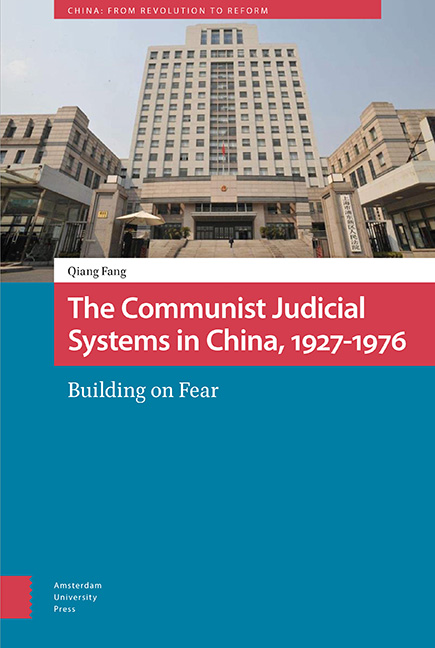Book contents
- Frontmatter
- Contents
- List of Tables
- Dedication
- Acknowledgement
- Acronyms
- Introduction: Building on Fear
- 1 Born in Blood: Origin of the Communist Judicial System in China, 1927–1935
- 2 Cornerstone or Aberration?: The Communist Judicial System during Wars with Japan and the GMD, 1936–1949
- 3 From “Excessive Lenience” to Harshness: The Communist Judicial System in the Early PRC, 1949-1952
- 4 A Deliberate Purge: Legal Reform in the Early PRC, 1952-1953
- 5 A Golden Age?: The Communist Judicial System in China, 1953-May 1957
- 6 The Great Leap of Law: The Communist Judicial System in China, 1957-1965
- 7 Not the Worst Period of Law: The Communist Judicial System in the Cultural Revolution, 1966-1976
- Conclusion: From Party’s Fear to People’s Fear
- Bibliography
- Index
4 - A Deliberate Purge: Legal Reform in the Early PRC, 1952-1953
Published online by Cambridge University Press: 18 June 2021
- Frontmatter
- Contents
- List of Tables
- Dedication
- Acknowledgement
- Acronyms
- Introduction: Building on Fear
- 1 Born in Blood: Origin of the Communist Judicial System in China, 1927–1935
- 2 Cornerstone or Aberration?: The Communist Judicial System during Wars with Japan and the GMD, 1936–1949
- 3 From “Excessive Lenience” to Harshness: The Communist Judicial System in the Early PRC, 1949-1952
- 4 A Deliberate Purge: Legal Reform in the Early PRC, 1952-1953
- 5 A Golden Age?: The Communist Judicial System in China, 1953-May 1957
- 6 The Great Leap of Law: The Communist Judicial System in China, 1957-1965
- 7 Not the Worst Period of Law: The Communist Judicial System in the Cultural Revolution, 1966-1976
- Conclusion: From Party’s Fear to People’s Fear
- Bibliography
- Index
Summary
Abstract
This chapter outlines the Party's growing distrust of the retained GMD judges and lawyers. Using excuses such as the high proportion of retained judges in people's court and the halfheartedness of retained judges in advocating Party's legal policies during the Three-Antis and Five-Antis Movements, the Party in 1952 overhauled its legal system and dismissed most retained GMD judges and lawyers. To replace such court personnel, the Party enlisted progressive workers, military veterans, and students as future judges. Their political allegiance might have been impeccable, but they had little or no legal knowledge and training. This chapter argues that CCP's purge of former GMD judges was an intentional program clearly aimed at making the judicial system a more submissive and faithful instrument of the Party in future campaigns.
Keywords: 1952 Legal Reform Movement, Shi Liang, Retain GMD Judges, new judges and old problems, deliberate purge
If the legal reform initiated in the late Qing (1901-1911) that went through the Republican period was the first in 20th-century China, then the 1952 Legal Reform Movement, less than three years after the establishment of the People's Republic of China (PRC), was the second major reform in mainland China. Not only did this reform condemn and jettison many long-held orthodox legal principles such as the “rule of law,” “judicial independence,” and “equality before the law;” it also officially set the model and rhetoric of the legal systems in the Mao Zedong era (1949-1976) in spite of several efforts of the Chinese Communist Party (CCP) to restore basic legal principles after the reform.
Given the great significance of the 1952 legal reform, it is quite surprising that the topic has been understudied by scholars. Most Western scholars have barely mentioned it. Chinese scholars have paid more attention to it, but, apart from minor differences in their writing styles and presentations, all of their arguments are very similar and fraught with tension. On the one hand, they all reference CCP's official accounts to justify the legal reform. On the other hand, they voice almost identical criticisms of its adverse consequences. For instance, Li Yusheng praises the 1952 legal reform that “exterminated the influence of the old legal system.” But he also acknowledges that the legal reform inevitably contained some flaws such as lowering the quality of judges and denouncing some principles of the rule of law.
- Type
- Chapter
- Information
- The Communist Judicial System in China, 1927–1976Building on Fear, pp. 143 - 178Publisher: Amsterdam University PressPrint publication year: 2021



